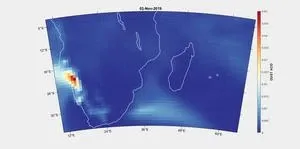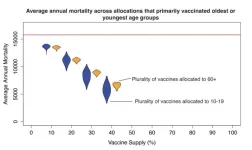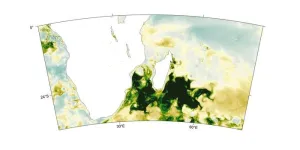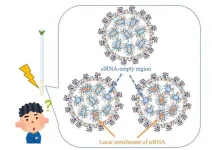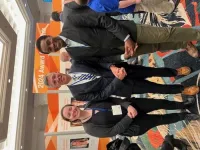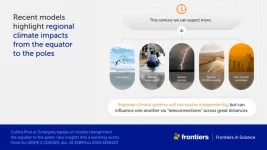(Press-News.org) Seattle, WA – October 1, 2024 – The BRAIN Initiative® Cell Atlas Network (BICAN) has launched its first major data release, marking a significant milestone in the ambitious effort to map the whole human brain.
The data, accessible through the BICAN Rapid Release Inventory, includes single-cell and single-nucleus transcriptomic and epigenomic profiles from humans, mice, and 10 other mammalian species. Sourced from multiple grants and labs within the consortium, including the Allen Institute, these data are from projects that aim to identify and define brain cell types based on molecular profiles.
“The tap is open, the data is flowing, and more is on the way,” said Carol Thompson, Ph.D., associate director of data management at the Allen Institute. “The hope is that if we can encourage data reuse and sharing by multiple labs, we can maximize the value of these datasets and really amplify the public investment into research.”
This effort is funded by the National Institutes of Health’s Brain Research Through Advancing Innovative Neurotechnologies® Initiative, or The BRAIN Initiative®. BICAN unites neuroscientists, computational biologists, and software engineers to create a comprehensive atlas of the human brain. This effort builds on earlier NIH BRAIN Initiative-funded projects at the Allen Institute and elsewhere, which mapped the cells of the entire mouse brain and parts of the human brain by studying the genes active in individual cells.
“This release represents a major step forward to this next frontier of neuroscience, where we finally will start to understand what sets the human brain apart,” said Fenna Krienen, Ph.D., an assistant professor at the Princeton Neuroscience Institute whose lab contributed data to today’s release.
“By bringing together experts across multiple specialties, the BICAN project is a model of open science,” said John Ngai, Ph.D., director of the NIH BRAIN Initiative. “The availability of this rapidly growing treasure trove of data will enable researchers around the world to propel the field toward a deeper understanding of the human brain in both health and disease, ultimately paving the way to more precise treatments and cures for devastating brain disorders.”
The open data release is designed to accelerate discoveries in neuroscience by providing unprecedented access to raw data from brain cells across species and developmental stages. Traditionally, it can take years between a scientist generating data and that information becoming available through a published paper.
This initiative marks a departure from that conventional approach, prioritizing early data sharing to foster collaboration and speed up research. “I hope this model becomes the norm, where we release data before it’s published and work together to create resources for the entire community,” Krienen said.
Researchers can now use this open dataset to map and define brain cell types, offering new insights into brain cellular diversity and function. “Neuroscience is a challenging field," Thompson said. "The more we can do to ensure the data we generate fuels more studies and helps the community, the better off we'll be.”
Learn more on portal.brain-bican.org.
About the Allen Institute
The Allen Institute is an independent, 501(c)(3) nonprofit research organization founded by philanthropist and visionary, the late Paul G. Allen. The Allen Institute is dedicated to answering some of the biggest questions in bioscience and accelerating research worldwide. The Institute is a recognized leader in large-scale research with a commitment to an open science model. Its research institutes and programs include the Allen Institute for Brain Science, launched in 2003; the Allen Institute for Cell Science, launched in 2014; the Allen Institute for Immunology, launched in 2018; and the Allen Institute for Neural Dynamics, launched in 2021. In 2016, the Allen Institute expanded its reach with the launch of The Paul G. Allen Frontiers Group, which identifies pioneers with new ideas to expand the boundaries of knowledge and make the world better. For more information, visit alleninstitute.org.
# # #
Media Contact
Peter Kim, Sr. Manager, Media Relations
206-605-9884 | peter.kim@alleninstitute.org
END
Using the European Southern Observatory’s Very Large Telescope (ESO’s VLT), astronomers have discovered an exoplanet orbiting Barnard’s star, the closest single star to our Sun. On this newly discovered exoplanet, which has at least half the mass of Venus, a year lasts just over three Earth days. The team’s observations also hint at the existence of three more exoplanet candidates, in various orbits around the star.
Located just six light-years away, Barnard’s star is the second-closest stellar system — after Alpha Centauri’s three-star group — and the closest individual star to us. Owing to its proximity, it is a primary target in ...
The American Cancer Society (ACS) today released Breast Cancer Statistics, 2024, the organization’s biennial update on breast cancer occurrence and trends in the United States. The new report finds breast cancer mortality rates overall have dropped by 44% since 1989, averting approximately 517,900 breast cancer deaths. However, not all women have benefited from this progress, notably American Indian and Alaska Native (AIAN) women, whose rates have remained unchanged over the past three decades. Also concerning ...
Children of immigrants to the United States typically incorporate themselves into US economic and cultural life, and this pattern of assimilation has not markedly changed in over a century. Today, one in seven US residents was born abroad, rates similar to those seen in the late nineteenth century. As immigrants’ countries of origin have shifted from Europe to Asia and the Americas, a narrative has developed that contemporary immigrants do not assimilate as thoroughly as older immigrants. But is this true? In a Perspective, Ran Abramitzky and Leah Boustan summarize their long-running research program matching individuals across historical US Censuses. The authors compare ...
A model suggests that vaccinating children and teens against the flu can help protect the elderly in tropical countries. Influenza kills up to 650,000 people worldwide every year. In part due to the lack of strong seasonality and differences in vaccine supply, optimal vaccination strategies for the tropics may differ from those in temperate zones. Joseph Servadio and colleagues parameterized an age-structured mathematical model of influenza transmission to the asynchronous, non-annual epidemiology of tropical influenza in Vietnam, a country with low vaccine coverage. The model includes three subtypes of the flu virus. Vaccinating year-round was found to be ...
A study links an unusual plankton bloom off the coast of Madagascar to drought in Southern Africa. Climate warming has intensified droughts around the world. When vegetation dies from lack of water, the wind can pick up and carry unprotected soil particles for thousands of kilometers. These dust particles can then act as fertilizer when deposited in seawater. Dionysios Raitsos and colleagues show that dust from drought-stricken Southern Africa caused a bloom of marine phytoplankton off the southeast Madagascar coast from November 2019 through February 2020. The team used standardized anomalies of dust aerosol optical depth from the Copernicus ...
Seven nudges aiming to reduce hateful speech online all failed—but the nudges unexpectedly succeeded in increasing engagement with harmless and wholesome content. Controlling hate speech is an ongoing challenge for online communities. In a pre-registered experiment, Tatiana Celadin and colleagues compared the effects of seven “nudges,” messages designed to promote prosocial behaviors: reminding posters of descriptive norms, injunctive norms, or personal norms; cooling down negative emotions; stimulating deliberation or empathy; and highlighting reputation. Over 4,000 Americans recruited through the online platform ...
Small interfering RNA (siRNA) molecules hold immense potential for treating diseases by silencing specific genes. Encapsulated in lipid nanoparticles (LNPs), siRNA can be delivered efficiently to target cells. However, the effectiveness of these therapies hinges on the internal structure of the LNPs, which can significantly impact their ability to deliver siRNA. Traditional methods often fall short in providing the detailed molecular insights needed to fine-tune LNP design for optimal therapeutic efficacy.
A study published in the Journal of Controlled Release on August 02, 2024, led by Assistant Professor Keisuke Ueda from ...
Mount Sinai Health System’s Chief Executive Officer (CEO) and the Emergency Department Chair at Mount Sinai Queens have been recognized with top honors for their outstanding achievements at the American College of Emergency Physicians (ACEP) 2024 Scientific Assembly in Las Vegas during a special ceremony on Monday, September 30.
Brendan G. Carr, MD, MS, FACEP, CEO, Professor and Kenneth L. Davis, MD, Distinguished Chair of the Mount Sinai Health System, received the Colin C. Rorrie, Jr, PhD Award for Excellence in Health Policy.
This award is an extraordinary ...
PULLMAN, Wash. – To appeal to the majority of consumers, winemakers may want to pay as much attention to what’s on the bottle as what’s in it.
A three-part experimental study led by Washington State University researchers found that women were more inclined to purchase wine that had labels with feminine gender cues. The more strongly the participants identified with other women, a phenomenon called “in-group identification,” the greater this effect was. A feminine label also influenced their expectation that they would like the wine better.
With women representing 59% ...
The effects of climate change are not distant future scenarios or confined to remote parts of the world—they are unfolding now, right in our own backyards. In 2023, extreme weather events impacted communities across every inhabited continent, causing major flooding, droughts, and wildfires.
While worldwide changes, such as increases in global mean temperature, often dominate discussions of mitigation actions, a detailed understanding of the regional impacts of a warming world is crucial for protecting communities from escalating risks. A team of researchers writing in Frontiers in Science synthesized results ...

